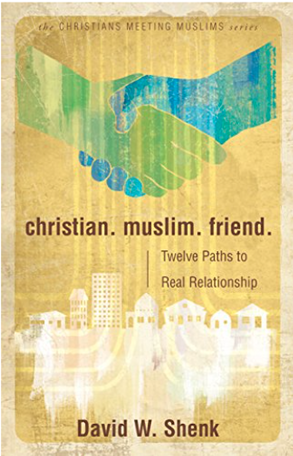posts
 David W. Shenk. Christian, Muslim, Friend: Twelve Paths to Real Relationship. Harrisonburg, VA: Herald Press, 2014. pp. 187, paperback, $14.99 Christian, Muslim, Friend is a recent work from David Shenk, a Mennonite missionary who has served in Somalia, Kenya, the USA, and who continually engages in peaceful dialogue with Muslim leaders around the world. Shenk has authored fifteen books and this new book is the fourth in his “Christians Meeting Muslims” series, which includes A Muslim and a Christian in Dialogue, Journeys of the Muslim Nation and the Christian Church, and Teatime in Mogadishu. In 2016, Christianity Today recognized Muslim, Christian, Friend as its book of the year for missions. In the book, Shenk lays out twelve paths or principles, each presented in a chapter, for engaging Muslims. Reflecting much on his five-decade journey of loving and commending Christ to Muslims, Shenk’s book offers much wisdom to Christ followers desiring to engage Muslims in the 21st century. In this brief review, I would like to highlight four themes that particularly struck me and seem instructive for the church today. Though chapter 6 focused on the place of hospitality in ministry to Muslims, hospitality was a pervasive theme throughout the book. Hardly a page goes by when Shenk is not relating accounts of having tea or meals with Muslim friends. Through showing and receiving hospitality—a strong cultural value in contexts where Shenk served but a central biblical value as well—many barriers to cultural and religious understanding were overcome which allowed for winsome gospel sharing. While chapters 10 and 11 emphasized the ministry of peacemaking, Shenk demonstrated throughout the book that peace was a foundational principle in his approach to Muslims. Evident in his tone toward initially hostile imams or even in the manner that he surrendered Mennonite Mission property to the government in Somalia during a revolution, Shenk’s posture of peace resulted in many open doors to share the person of Jesus the Messiah. Shenk’s emphasis on peace was coupled with a boldness for communicating the essentials of the gospel—particularly the person of Christ and his death, burial, and resurrection. In his ministry, Shenk did not hedge for a moment on the centrality of the cross—often a difficult issue for Muslims (see chaps. 7-9, 12). Remaining gospel-centered, Shenk consistently identified himself as a messenger for Jesus the Messiah, challenging his readers to pursue integrity in how they present themselves to Muslims (see chaps. 1-2). In short, for Shenk, a peaceful posture and a bold witness for Christ are quite compatible. Finally, throughout the book, Shenk demonstrates a good knowledge of Islam, the Qur’an, Hadith, Islamic theology, and Muslim traditions. However, he uses this knowledge to build bridges of understanding with Muslims while avoiding polemics. Though winsome to defend central gospel truths, Shenk refuses to attack Islam or Muslims in any way, laying the groundwork for respectful witness. In summary, Shenk’s book is quite accessible and ought to serve as basic reading for all followers of Christ desiring to understanding and minister to Muslims. It would also serve as an excellent text for a course on approaches to Muslim evangelism. Comments are closed.
|
Archives
November 2023
|
 RSS Feed
RSS Feed
